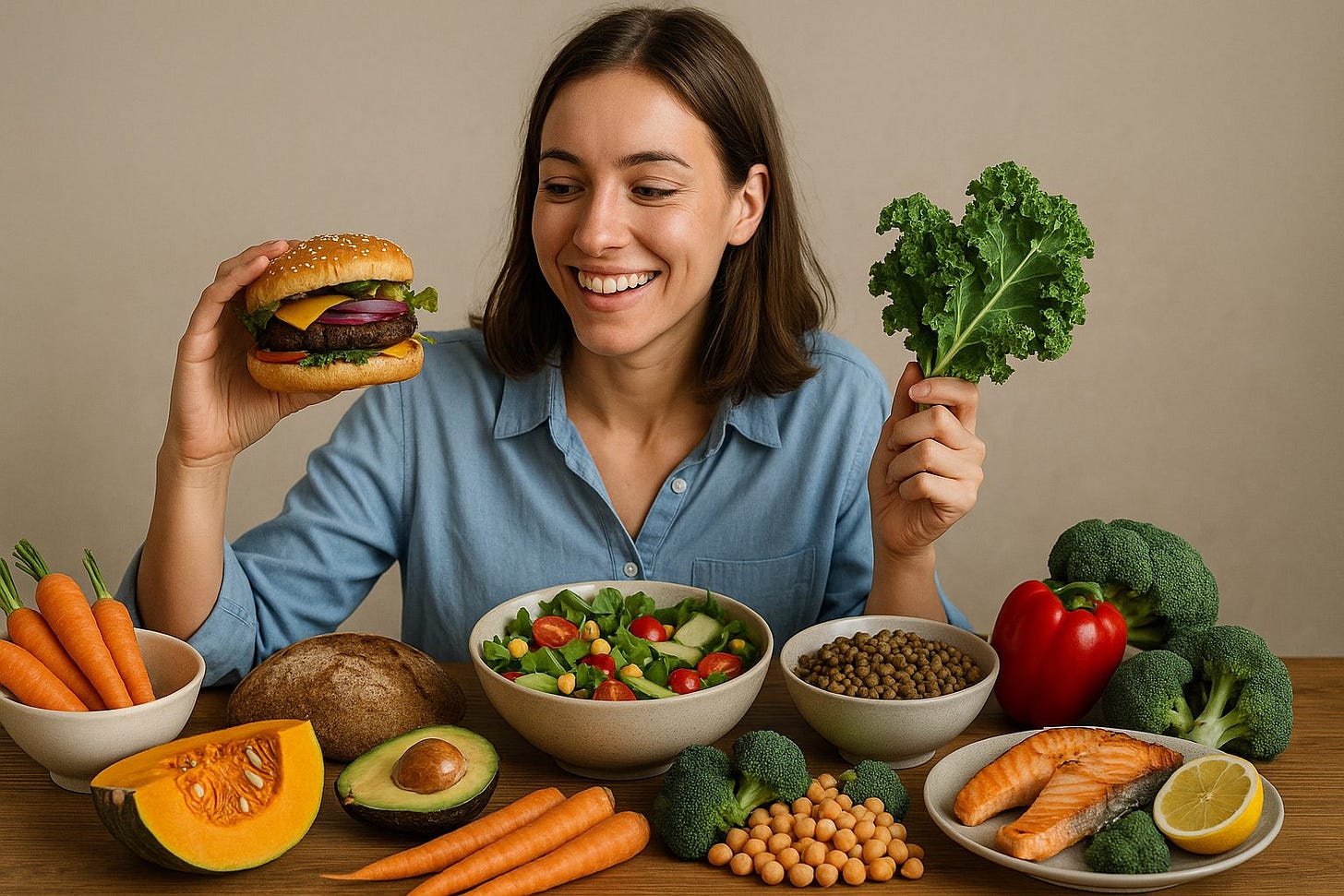6 Ways to Eat Sustainably Without Going Vegan (Unless You Want To)
Because you can love burgers and still save the planet 🍔🌍
You don’t have to go full-vegan (unless you want to) to make a real dent in your food-footprint. In fact, modest shifts in what’s on your plate can ripple outward—helping the environment, your health, and maybe even your wallet. I’m not preaching perfection. I’m offering possibility. Let’s explore six actionable, realistic ways to eat more sustainably—without giving up your favourite meals or embracing a rigid regime. Ready? Let’s dive in.
1. Eat More Plants—Even If You Still Eat Meat
Here’s the simple truth: the more plants you eat and the fewer animal-products you consume, the better the impact. That doesn’t mean zero meat, zero dairy—just thoughtful reduction. For example, most of your meals might be veggie-heavy, with fish or meat popping up once in a while. That’s essentially the ethos of the Flexitarian Diet.
Not only is it easier to stick with long-term than a full elimination diet, but studies show it has health and environmental benefits too.
Start with: one meatless day a week. Or cut back on red meat and load up on beans, lentils, colourful veggies. Baby step
💡 CTA: Try “Meatless Monday”—just one day this week commit to no meat and see how you feel.
2. Choose Better When You Do Eat Animal Products
If you’re going to eat meat, fish, or dairy, make those choices count. Animals raised in intensive systems tend to use more resources, generate more emissions, and often involve poorer welfare standards.
Focus on:
Pasture-raised / grass-fed for meat and dairy where possible.
Sustainably sourced seafood (look for certified labels or local fisheries).
Minimising high-impact meats like beef and lamb—these require far more land, water and generate more greenhouse-gas than poultry or plant-based proteins.
You’re not aiming for guilt-free perfection. You’re aiming for better choices.
💡 CTA: Next time you shop, pick one animal-product and check its origin or special label—just once.
3. Waste Less, Use Everything, Buy Local
One of the biggest unsung heroes of sustainable eating is food-waste reduction. It matters. Because when you buy food that then goes into the bin, all the resources used to produce it—cash, water, land—are essentially wasted.
What you can do:
Plan your meals so you use fresh and leftovers.
Compost scraps or find a compost scheme.
Buy local seasonal produce—less transportation, fewer preservatives, better for the community.
These actions don’t require you to adopt a new diet. They just require better habits.
💡 CTA: This week, commit to using up leftovers for one full meal rather than discarding them.
4. Rethink the “Meat Every Day” Habit
Here’s a mindset angle: Many of us grew up thinking meat equals main event. What if we flipped that? Make plant-based ingredients the star, and meat optional or side-kick.
Research on what are called “meat-reducers”—people who consciously eat less meat without going vegan—shows this is not only doable but widely preferred.
Explore patterns like:
Two days a week vegetarian or pescatarian (fish or seafood only).
Using meat as a flavour accent rather than the centrepiece.
Smaller changes = bigger cumulative effect.
💡 CTA: Pick two meals this week where meat is not the main ingredient—perhaps you make a lentil chilli or chickpea curry.
5. Embrace Whole Foods and Un-Processed Choices
Sustainable eating is not just about ‘what’ but also about ‘how’. Whole foods generally use fewer industrial inputs, less packaging, less energy for processing. That means less environmental cost.
Focus on:
Legumes, whole grains, fresh fruit & veggies.
Minimally processed versions of foods you already love.
Research shows younger flexitarians favour less-processed foods rather than heavily processed meat substitutes.
Also: the shift is scalable and realistic. It doesn’t ask for perfection—but for preference.
💡 CTA: On your next shopping trip, grab one fresh whole food you don’t usually buy and incorporate it into a meal.
6. Educate Yourself—Because Knowledge = Power
This may sound obvious, but it’s overlooked. The more you know about your food system, the better choices you’ll make—intentionally and consistently.
Some helpful frameworks:
The “planetary health diet” concept: eating more plants, less meat and dairy, and staying within planetary boundaries.
The “reducetarian” approach: reducing consumption rather than eliminating.
Staying informed means you’re not drifting aimlessly—you’re eating with purpose.
💡 CTA: Spend 10 minutes today reading one article about how food choices impact climate or health. Then reflect: what small change will you make this week?
Also read: 10 Sustainable Food Hacks to Eat Greener Without Breaking the Bank
Conclusion
Look, sustainable eating doesn’t demand perfection, guilt or deprivation. It demands intention. These six strategies show you can love flavour, enjoy the occasional steak (or burger), and still move the needle on planet-health. Plants get centre stage. Animal products come along thoughtfully. Waste goes downward. Knowledge goes upward.
So—what’s your next move? Pick one of the CTAs above, do it this week, and let’s start a domino effect. Because yes—you can eat sustainably without going full vegan (unless you want to, of course). 🌱✨
And if you want help crafting a week of delicious, sustainable meals or sourcing good-animal-welfare labels—just say the word.


